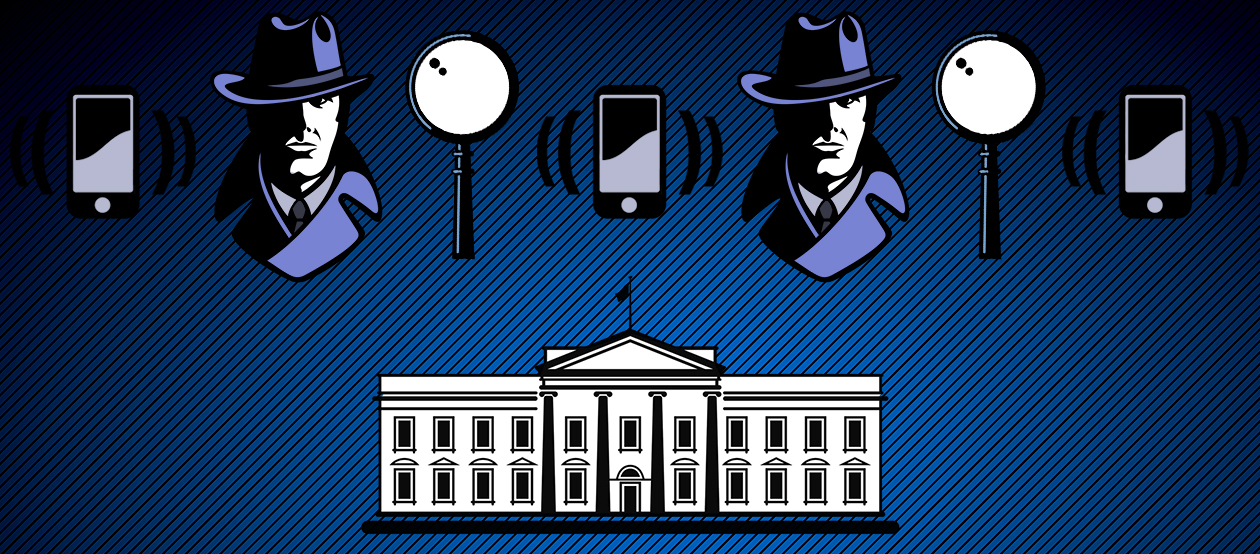The NSA conversation that never happened


A free daily email with the biggest news stories of the day – and the best features from TheWeek.com
You are now subscribed
Your newsletter sign-up was successful
It’s a snowy day in January 2009. Four men and one woman gather in a small basement-level conference room near the National Security Operations Center of the National Security Agency. Its door, about two inches' worth of expanded steel, is normally protected by an electronic security system. But this day, an armed guard, a member of the NSA’s police force, stands an additional watch. Inside the room, the discussants have been reviewing the holiest of holies — the biggest and best secrets the agency has, its aces, and they’re about to make a very important decision. Joining the conference, via a DRSN line from a Sensitive Compartmented Information Facility in Chicago, is the NSA’s director, Lt. Gen. Keith Alexander. He is in full dress, and he’s impatient to get things going.
Everything you’re about to read is completely fictional.
General Alexander: Obama is coming here for his first briefing on the agency in 30 minutes, guys. Let’s make a final decision.
The Week
Escape your echo chamber. Get the facts behind the news, plus analysis from multiple perspectives.

Sign up for The Week's Free Newsletters
From our morning news briefing to a weekly Good News Newsletter, get the best of The Week delivered directly to your inbox.
From our morning news briefing to a weekly Good News Newsletter, get the best of The Week delivered directly to your inbox.
Bob Inglis, deputy director, NSA: Okay. As we discussed, you’ll start by giving the 30,000-foot picture. The history of the NSA. The top-line budget. The chain of command. Where we fit in the I.C.
Wise old man: Don’t you think he knows the basics? He’s read the briefing books. Maybe you should just get to the programs.
Alexander: Well, where should we start?
Director, Signals Intelligence Division: With FISA. Indoc-him into STELLARWIND. Bullet points — what we can do, what we can’t do. An easy breakdown. FISA Establishment. FISA 702. FISA 705. PRISM. Then show him the latest orders for FISA business records — the phone and internet metadata.
A free daily email with the biggest news stories of the day – and the best features from TheWeek.com
Bob Inglis, deputy NSA director: Keep it simple. If he wants to know more, he can always ask. Every time we try to go in depth with elected officials, we always wind up confusing them.
Wise old man: He’s going to be concerned about flap potential. All politicians are.
Alexander: That’s why this stuff is secret. Look, I’m not going to have time to talk through all the FISA controversies. I don’t have the patience to get into the technical details, either, to be frank. I’ve never met a politician who cares, anyway. And I want to keep his interest. We start with what’s interesting to him.
SID Director: So tell him what we’ve contributed. Sixty percent of the P-D-B comes from us. Two hundred and fifty terrorist plots foiled. Chinese spy ring broken. What we know about Russians and START II compliance. The Iranian codes. Make it glittery.
Alexander: That’s good stuff! He’s big on proliferation.
Wise old man: First impressions are very important. I think he needs to know that you’re candid, which means that you need to be upfront with him…
Alexander: I don’t think we treat the president as someone we need to brief, or someone is going to be our lord and protector. We treat him as a partner, in a sense. His policy enables us. He is our customer. He needs to know what we can do, in order to figure out what he needs to do.
Wise old man: Can I make a suggestion? Can we at least talk him through the process of how we manage risk and reward?
SID Director: Senator Obama is not going to want a lecture.
Wise old man: Not a lecture. An assessment. Let’s go back to our basic principles for just a second. We steal stuff, based on his policy, to add value to his policy decisions in the future. No more, no less. A lot of the stuff we steal is not controversial. But some of the stuff we do, the stuff buried within our ECIs and compartments, is on the edge. And hey, we like it that way. We earned the right to do it. We do it well. But he needs to know. Because, maybe, he won’t want to take the same risks.
Alexander: You’re accusing us of trying to cover up what we’re doing. That’s ridiculous. His staff is going to know all of this. It’s their responsibility to fill in the details. We just have a limited amount of time to make a first impression. We can always go back with more details later.
Wise old man: But we won’t. Will we? We’re all good people. Each and every one of you I’ve known for years. That’s why I’m a wise old man. But we’ve grown so confident in ourselves, and our abilities, and we define everything by our capacity here, in complex engineering language that only people with a lot of training can understand, that I think we often miss the embassy for the bugs, if you will. Why don’t we run down a list of significant programs we’ve briefed to the committees in Congress? That’s where I’d start. Remember: He’s a political leader. From an organizational perspective, I’d argue that he has to know what land mines are out there.
Alexander: That sounds reasonable.
General counsel: Nope. Won’t work. The committees get notified of any new, quote, “significant intelligence activity.” A lot of the stuff in the ECIs, including a lot of our corporate partners, the RAMPART program, SCS operations, we haven’t briefed.
Wise old man: Why the hell not?
General counsel: Because it complicates things. And we don’t have to. We’ve been collecting on foreign leaders and political candidates for years, stuff I know about that dates to the Reagan administration, for chrissakes. That’s not a new activity. Hey, if they wanted to know, we’d tell them. But they don’t care about that stuff. They care about domestic intercepts. They care about what’s going to burn their butts.
Wise old man: Has it not occurred to you that the stuff we do to our allies is as risky as the stuff we do to our citizens? And how could Congress know what to ask if we don’t define the universe for them?
Inglis: So now you’re saying we shouldn’t collect foreign intelligence because it’s risky. Bulls---. The FISA stuff leaked because it had to leak. Everyone kind of knew that. But we’ve not had a real significant leak of classified information about NSA foreign activities since some of the cable-tapping stories in 2000. That stuff is not going to come out. It’s well protected.
Wise old man: How is bugging Angela Merkel not a significant intelligence activity? I know why we started to do it. I was the one who got the phone call from State asking that we put it on our list. I know that’s legal. I know that we didn’t just decide to use our resources in that way. But I’m not accountable for what we do with that product. And if it ever gets out, they have to deal with it, not me.
Alexander: When we send the NSC our SIGINT cuts that say “based on a phone conversation between the Chancellor of Germany and her defense minister," where the hell else would they think we get that information?
Wise old man: I may be out of line here, but what would Richard Bissell say if he were in this conversation right now?
Collectively: Oh, Jesus.
Wise old man: Hear me out. Richard Bissell never deceived a soul about the Bay of Pigs. He always told people exactly what they wanted to know. But he never told people what his limits were, what the constraints were, not because he thought he didn’t have any, but because he was used to winning every fight about them. And then he lost a fight. And Kennedy never got the importance of airstrikes. And you know what happened.
Alexander: So I’m Richard Bissell now? The NSA has been more transparent, more open about its activities, and we’re subject now to more oversight than every before, than any other country that does intelligence.
Wise old man: And we’re also bigger and more powerful than ever. And we do much more than we’ve ever done. All I’m saying is that the elected president of the United States deserves to be treated like an adult. We need to look out for him. And for us, quite frankly, because if this stuff ever leaks...
General counsel: It won’t! Come on.
Wise old man: If it ever leaks, then SIGINT as we know it will collapse. We’ll never get the cyberauthorities we need. The more we disclose, the better chance we’ll have to preserve and expand our authorities to protect the nation. That’s all I’m saying.
Alexander: Wise old man, who are you, anyway? Why are you here?
Wise old man: I’m the person in every cinematic imagining who talks truth to power. But maybe I’m just a figment of your imagination.
Marc Ambinder is TheWeek.com's editor-at-large. He is the author, with D.B. Grady, of The Command and Deep State: Inside the Government Secrecy Industry. Marc is also a contributing editor for The Atlantic and GQ. Formerly, he served as White House correspondent for National Journal, chief political consultant for CBS News, and politics editor at The Atlantic. Marc is a 2001 graduate of Harvard. He is married to Michael Park, a corporate strategy consultant, and lives in Los Angeles.
-
 The environmental cost of GLP-1s
The environmental cost of GLP-1sThe explainer Producing the drugs is a dirty process
-
 Greenland’s capital becomes ground zero for the country’s diplomatic straits
Greenland’s capital becomes ground zero for the country’s diplomatic straitsIN THE SPOTLIGHT A flurry of new consular activity in Nuuk shows how important Greenland has become to Europeans’ anxiety about American imperialism
-
 ‘This is something that happens all too often’
‘This is something that happens all too often’Instant Opinion Opinion, comment and editorials of the day
-
 The recycling crisis
The recycling crisisThe Explainer Much of the stuff Americans think they are "recycling" now ends up in landfills and incinerators. Why?
-
 The L.A. teachers strike, explained
The L.A. teachers strike, explainedThe Explainer Everything you need to know about the education crisis roiling the Los Angeles Unified School District
-
 The NSA knew about cellphone surveillance around the White House 6 years ago
The NSA knew about cellphone surveillance around the White House 6 years agoThe Explainer Here's what they did about it
-
 America's homelessness crisis
America's homelessness crisisThe Explainer The number of homeless people in the U.S. is rising for the first time in years. What’s behind the increase?
-
 The truth about America's illegal immigrants
The truth about America's illegal immigrantsThe Explainer America's illegal immigration controversy, explained
-
 Chicago in crisis
Chicago in crisisThe Explainer The "City of the Big Shoulders" is buckling under the weight of major racial, political, and economic burdens. Here's everything you need to know.
-
 The bad news about ISIS's defeat in Ramadi
The bad news about ISIS's defeat in RamadiThe Explainer The contours of a broader sectarian war are coming into focus
-
 America can still destroy the world
America can still destroy the worldThe Explainer The decline of U.S. military power has been greatly exaggerated
